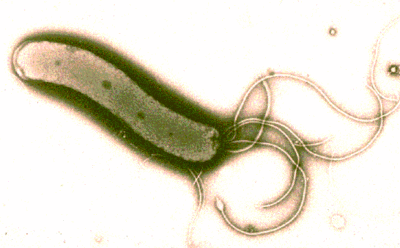Rapid evolution allows Helicobacter pylori, the bacterium that causes ulcers in humans, to
evade the immune system during the early, acute phase of infection. This
finding complements earlier work that quantified how quickly H. pylori mutations accumulate during
chronic infection. During the acute phase, mutational rates are 30 to 50 times
greater than during the chronic phase.
To trace H.
pylori infections in human patients, the researchers used a next-generation
sequencing approach. As the researchers indicated in their article, they
analyzed “the rate and pattern of genome evolution in H. pylori from the genomes of two input strains isolated from human
volunteers with asymptomatic infection, and the genomes of two output strains
collected 20 and 44 days after re-infection.”
Whether bacteria other than H. pylori undergo a similar burst of
accelerated evolution immediately after infection is not yet known, but the
team plans to investigate other common human pathogens in future research.



No comments:
Post a Comment
Pharmaceutical Microbiology Resources